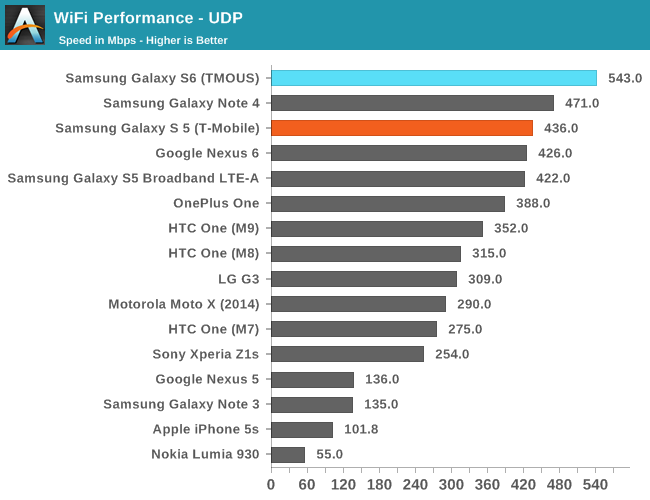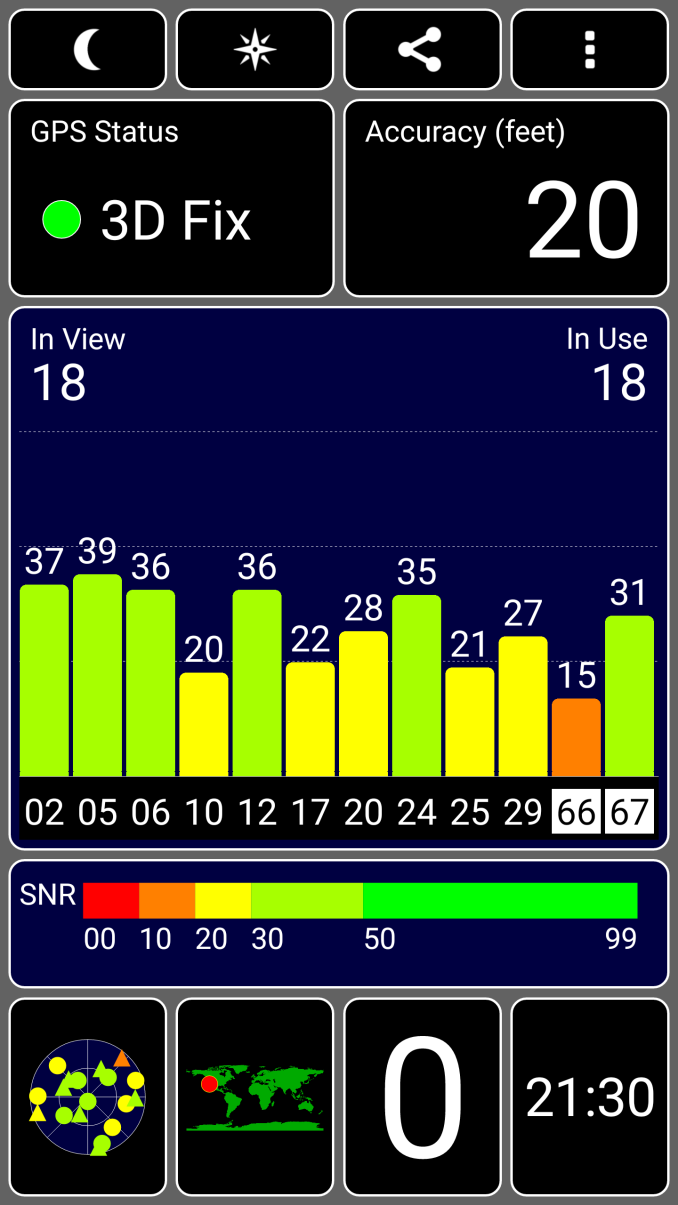The Samsung Galaxy S6 and S6 edge Review
by Joshua Ho on April 17, 2015 9:00 AM EST- Posted in
- Smartphones
- Samsung
- Mobile
- Galaxy S6
- Galaxy S6 Edge
WiFi Performance
As WiFi is still quite important on a smartphone for anyone on a relatively limited data plan, it's also important to test how well a device behaves when using WiFi. In order to do this, we use our standard iperf test to see how fast the device can send UDP packets. In the case of the Galaxy S6, we see that it shares the same BCM4358 WiFi/Bluetooth combo chipset that we first saw in the Galaxy Note 4. As always, in order to ensure maximum possible performance we're using an Asus RT-AC68U router to avoid issues with the router bottlenecking the phone.

As we can see, the Galaxy S6 manages to do better than anything else we've been able to test in recent memory. I'm not sure what's causing the difference in performance when comparing against the Note 4, but it's definitely possible that the antenna configuration has been improved to increase coherence and therefore the performance benefit that comes from MIMO.
GNSS Performance
In most of the Galaxy S6 variants, as there is no Gobi modem that could be used to provide GNSS location services it seems that Samsung has turned to Broadcom to provide satellite location services. In the case of the Galaxy S6, we see a Broadcom BCM4773 location chipset. This includes support for all of the major constellations including GPS, Beidou, and GLONASS in addition to SBAS, which helps to improve accuracy beyond what conventional GPS satellites can provide. To get a good idea for how good this system is I tried testing how long it took for a lock to happen on a clear night with airplane mode on. The Galaxy S6 managed to acquire a lock in 20 seconds which is likely to be a warm lock but a cold lock will likely take a minute without assistance data. After an additional 20 seconds I saw a peak accuracy of 20 feet, so there shouldn't be any notable issues with the GPS system. For the Galaxy S6 CDMA variants it's likely that location will be done using the MDM9x35 Gobi modem rather than the Broadcom solution used in the GSM Galaxy S6.
Misc
For the Galaxy S6, Samsung has fundamentally uprooted how they traditionally design their phones, and in the case of the entire radio architecture this is especially true. Instead of the standard Qualcomm modem, we see that Samsung has moved to the Shannon 333 GSM/LTE modem for the Galaxy S6 GSM variants. Given that this is likely to be the same modem that is in the Note 4 LTE-A it’s likely that this modem will ship as category 6, while we have reason to believe it's ultimately capable of UE category 9. However, whether the RF front-end is capable of handling 3x carrier aggregation of up to 450 Mbps on the downlink is a different question and is likely to be one that we won’t know the answer to unless support is added in an OTA update.
The transceiver, envelope tracker, antenna tuner, and most of the components that would traditionally be Qualcomm parts in a Snapdragon-equipped phone have also been replaced with Samsung Shannon components based upon the Chipworks teardown. In general though, I didn’t notice any issues with this choice of RF components although judging by the use of Qualcomm modems in the CDMA variants it’s likely that such a move was necessary in order to ensure good RF performance on CDMA networks but not GSM networks due to Qualcomm’s experience with CDMA2000. It's likely that anyone that has had previous experience with the CDMA Galaxy Nexus would be able to attest to this.
Unlike some other variants, we’ve noticed that the Galaxy S6 T-Mobile variant uses an Audience eS804 voice processor to enable hot word detection and S-Voice launching and is likely also active in phone calls and in any other scenario where noise cancellation and voice processing would be beneficial. The T-Mobile variant that we received also uses an NXP PN547 NFC module rather than a Samsung NFC module, but we did confirm that there is an ST-M digitizer used for the touchscreen and a Cypress CapSense PSoC for the capacitive keys.
Although I still don’t have the equipment to test speakers properly, subjectively the audio quality of the Galaxy S6’s single downward-firing speaker is good. The volume gets high enough that I never really used it on maximum volume for videos, but it’s still annoying to have to cup my hand to ensure that sound is going towards my face rather than traveling away. Overall the M9 still has much better speakers for a good media experience, but there’s nothing wrong with the speaker on the Galaxy S6 for casual use. I definitely found myself using it less than the front-facing speakers on the M9 though.











306 Comments
View All Comments
FlushedBubblyJock - Friday, April 24, 2015 - link
who are you kidding, yourselves ?YEARS AGO our big gov sucked all your data, and has been ever since
retroactive and completely illegal pardons were then issued
Frankly I'd rather he laws and the reality be that the idiot criminal government never be able to get anything, and the fact that they are sucking down everything all the time means I can't wait for it to stop
It's a principle, not a crime, sheep
They have no right to anything, EVER, that's what law abiding citizens DEMAND.
yvn - Friday, April 17, 2015 - link
I compared the edge to my iPhone 6 plus display and find still the display of the edge is still too saturated even in basic mode, how so...according to the benchmarks the display should be as good as the 6 plus but it was not, the color accuracy is still not as accurate??FlamingDragon810 - Friday, April 17, 2015 - link
Maybe because you're so used to the washed-out colors on your iPhone 6?The S6 has the most color-accurate display on the market. It's far better than the cheap IPS display on the iPhone 6.
yvn - Friday, April 17, 2015 - link
it is not true, my iPhone 6 plus display matches spot on with my calibrated iMac 27" screen via Spider 4 and Color Eyes Display Pro....so no Sir you are the one that is used to oversaturated colors on Samsung phones.....I am a full time photographer so I know a thing or two about accurate colorsFlamingDragon810 - Friday, April 17, 2015 - link
http://www.extremetech.com/mobile/200868-displayma...You're a full-time photographer who is used to washed-out colors from Apple.
Peichen - Saturday, April 18, 2015 - link
Ignore the troll. Both S6 and 6+ screen are accurate but S6 have lower white point than 6+. I am not sure about the color mode and adaptive color setting on the phone. I would suggest you wait for Erica Griffin's full review to come out on YouTube as she review color mode in detail. She only have hands-on review at the moment.generalako - Saturday, April 18, 2015 - link
You clearly don't know what the hell you are talking about. Read this review of the screen of the S6 by Displaymate (the only actual and legitimate display-tester out there): http://www.displaymate.com/Galaxy_S6_ShootOut_1.ht...The Galaxy S6 (like the Note 4) has by far the best display out there.
" The measured Absolute Color Error for the Galaxy S6 Basic Screen Mode is just 1.6 JNCD, tied with the Galaxy Note 4 as the most color accurate display that we have ever measured for a Smartphone or Tablet, which is visually indistinguishable from perfect, and is very likely considerably better than your living room TV or any display that you own.
assasinezio34 - Friday, April 17, 2015 - link
i have sold my s6 after 7 painful day.i really loved this phone.camera,screen exc..but battery life drove me crazy.returned to my iphone6 plus.Margalus - Friday, April 17, 2015 - link
I have never owned an apple product, and thought I never would. But after my experiences with the s4 and the android os things might be different next time. I still don't like apple and don't really want an iphone. I am a very light user, it's mostly for phone calls. What good is a phone that on it's best day will last about 16 hours. Then on other days with occasional bugs that cause the OS to go crazy and use the battery up in 4-5 hours with no usage..UrQuan3 - Friday, April 17, 2015 - link
Overall excellent review. I still really appreciate the screen color and gamut testing. It sets Anandtech apart. What equipment are you looking for to do audio testing? In my case, I am more interested in the headphone output than the speakers as I can't use the speakers in public anyway.